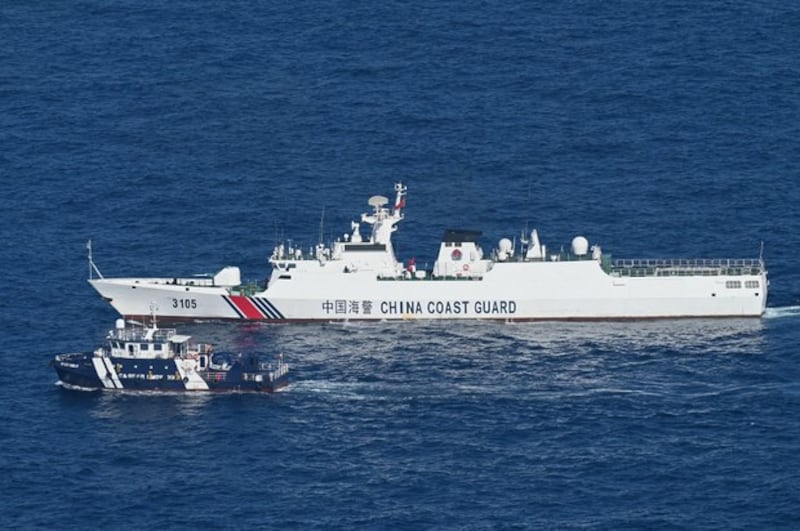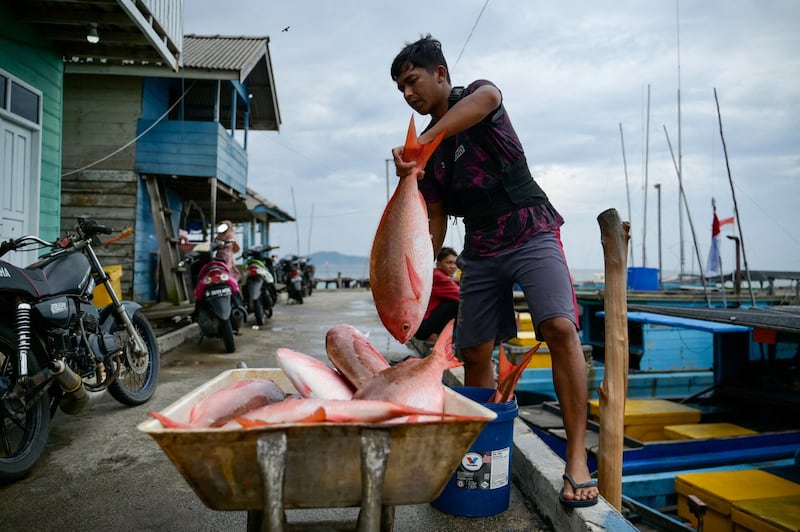A majority of Indonesians perceive China’s activities in the South China Sea as a threat to their country’s sovereignty, with nearly half favoring a defense alliance with Southeast Asian nations to strengthen its position, a new survey has revealed.
Most respondents believe that Beijing’s actions in the waterway also threaten member-states of the Association of Southeast Asian Nations (ASEAN), according to the survey released this week that was conducted by Indonesia Strategic and Defence Studies (ISDS) and Kompas Research and Development.
“The Indonesian public does not like the aggressiveness of Chinese ships which are pushing into Indonesian territory,” ISDS co-founder Erik Purnama Putra told BenarNews.
Some 73% of respondents viewed China’s presence in the South China Sea as a menace to Indonesian sovereignty, while even more – 79% – perceived Beijing as a threat to ASEAN nations. This sentiment is strongest among people aged 27-42, the study found.
The poll indicated that Indonesians prefer ASEAN as the best partner for defending their territory, and a defensive alliance with these nations as the best bet for security. The United States was the most preferred non-ASEAN partner, the survey suggested.
The poll results show that generally people think that the conflict in the South China Sea is a matter of territorial sovereignty, Dimas Okto Danamasi of Kompas Research told an online press conference in Jakarta on Tuesday, when the survey was released.
“The survey was held to measure the extent of public awareness regarding state sovereignty in four forms, namely political, economic, cultural and territorial sovereignty,” Dima, a researcher at Kompas Research, said.

The ISDS-Kompas Research survey polled 312 respondents between the ages of 17 and 60 in five cities – Medan, Jakarta, Yogyakarta, Surabaya, and Makassar.
The South China Sea remains a major source of friction among several territorial claimants. Beijing’s assertive actions have also alarmed the United States.
China claims nearly the entire South China Sea, including waters within the exclusive economic zones (EEZs) of Taiwan and ASEAN member-states Brunei, Malaysia, the Philippines and Vietnam.
While Indonesia does not regard itself as a party to the dispute, its EEZ overlaps with China’s expansive nine-dash line. Beijing claims historic rights to parts of that sea overlapping Indonesia’s EEZ in and around the Natunas.
Indonesia, Vietnam and Malaysia have accused China of disrupting their oil and gas exploration activities. And the Philippines has expressed concern over recent encounters near Second Thomas Shoal (Ayungin Shoal) and Scarborough Shoal, which both lie within its EEZ.

An agreement to prevent such skirmishes from developing into a full-blown conflict – in the making since 2002 – will hopefully be completed by 2025, said Hadi Tjahjanto, coordinating minister for political, legal and security affairs.
Negotiations between ASEAN and China for this agreement, a code of conduct (COC) for the South China Sea, resumed last year when Indonesia held the rotating chair of ASEAN.
China “is a strategic comprehensive partner for Indonesia and ASEAN which has a central role in regional peace and stability,” Hadi said.
“We all hope that the COC can become an effective document, substantive, and actionable to avoid escalation and at the same time increase mutual trust and mutual confidence between countries with interests in the South China Sea,” he added.
There also needs to be increased collaboration among ASEAN coast guards, Vice Admiral Irvansyah, leader of Indonesia’s Maritime Security Agency (Bakamla), said at the online press conference.
“The situation in the South China Sea requires civil order management, rather than a military emergency response,” he said.
‘Diplomacy is the key’
Erik, the ISDS co-founder, advocated for a united ASEAN front and stressed the need for closer coordination among maritime security stakeholders, including the military and Bakamla, to make patrols more efficient and effective.
“As a non-aligned country, Indonesia cannot form military alliances, but instead [it] seeks as many friends as possible to solve common problems,” he said.
Agus Widjojo, Indonesian ambassador to the Philippines, said he was confident that diplomatic strategies and leveraging national power would be central to resolving the sea dispute. And here, he highlighted Indonesia’s potential influence as a major Southeast Asian power.
“Diplomacy is the key to resolving the South China Sea conflict, as no nation stands to gain from its escalation,” he said.
BenarNews is an RFA-affiliated news service.
